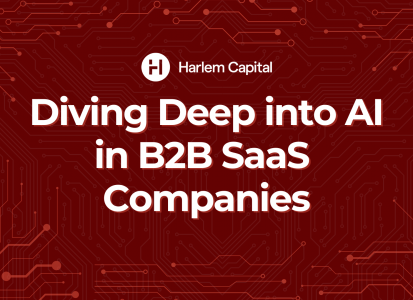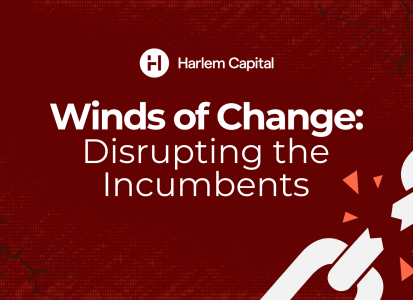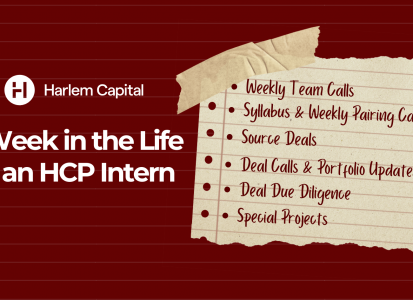More Equity Podcast: Julia Collins of Planet FWD
by Harlem Capital
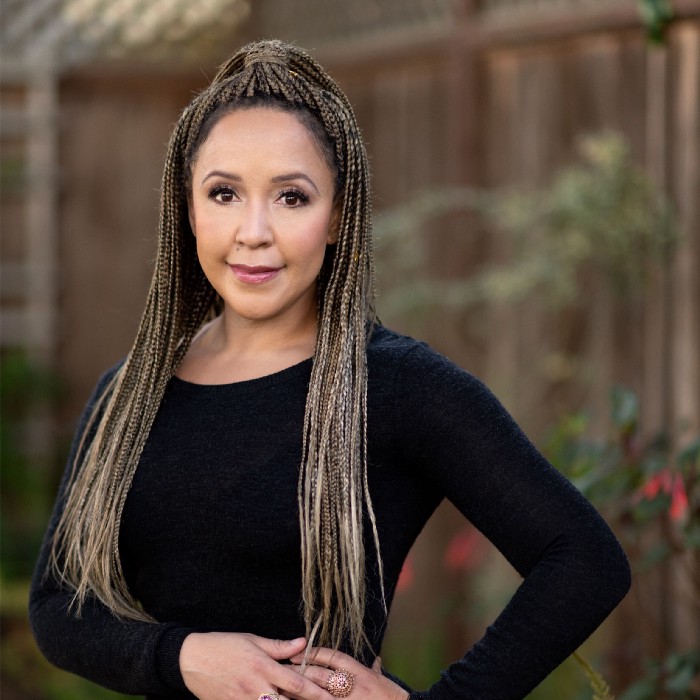
We are excited to launch the Harlem Capital More Equity Podcast, be sure to follow to stay up to date on the amazing interviews we have scheduled. Now lets dive into Part 1 of Harlem Capital’s Female Founders Series featuring Julia Collins of Planet FWD, the first Black woman with unicorn status who has raised over $450mm in VC funding.
Julia’s belief in the ability of food to heal, sustain, and connect runs deep. Born and raised in San Francisco, where her grandparents settled during the Great Migration, Collins describes a childhood where their family dinner table was the heartbeat of their community. It is no accident that Collins has spent most of her career working with food.
After several ventures in the restaurant industry, Collins blended her love for delicious cuisine with her passion for technology. In 2015, Collins co-founded Zume Pizza, a pizza company staffed by humans and robots that became the first unicorn company ever founded by a Black woman. Today, she runs Planet FWD — a startup that aims to be the first regenerative food brand and platform. Collins recently closed $2.7M in funding for the company. She describes Planet FWD as an entrepreneurial endeavor which “completely aligns with her mission on this Earth — to create better outcomes for people on the planet through food.”
Julia spoke with us about the lessons she’s learned from her previous entrepreneurial endeavors, what it was like to be a pregnant woman of color raising money in Silicon Valley, and the impact she hopes to leave on her family, the sustainability movement, and the world around us.
Interview has been edited and condensed for clarity.
You’ve had an incredible journey throughout tech and many parts of the restaurant world. To start off, could you tell us about your entrepreneurial career and what inspired you to found Planet FWD?
Absolutely. I’m born and raised in San Francisco, California. My grandparents moved here during the Great Migration, which was when Black people from the South moved to the North to take advantage of new economic opportunities. My grandparents were trained in dentistry, so they moved to the Bay Area to start a dental practice serving communities of color. And the reason that’s so important to me and my entrepreneurial journey is as a kid growing up, my understanding of community was founded in my grandparent’s dental practice and their home.
We were the kind of home where everyone was welcome. Our home was the center of the community in many ways and food was how all of these people from different walks of life connected. Our dinner table became an extension of our connection to the broader community. I’ve always wanted to work in the world of food. I’ve also always been a huge nerd and really loved math and science and technology. It’s no accident that I’ve spent my entrepreneurial career working at the intersection of food and tech.
When I learned that I was going to become a parent in 2017, my love for food and technology took a more narrow focus as I began to understand the relationship between food systems and climate change. As I was preparing to be a mom, I began to be hyper-aware and hyper-focused on what the climate change conversation meant through the eyes of this little person that I was bringing into the world with my partner. I began to build a thesis around the intersection of food and technology to drive a reversal of climate change.
The way we do that at Planet FWD is building on top of this idea that reforming our food system can not only reduce greenhouse gas emissions but also draw-down, sequester, re-balance atmospheric carbon. We do that in two ways. The first is by creating the world’s first climate-friendly snack brand, which will launch in early 2021. The second is by creating a data service linking regenerative farmers to brands and consumers who are hungry for climate-friendly products.
I love that you’re looking at reversing climate change in such a holistic way. Diving into your work and the product of climate forward, I think it’s amazing that you’re not actually on your first company, you worked on Zume Pizza before starting Planet FWD. Could you talk about any lessons you brought with you?
I’ve had several at-bats in the entrepreneurial space. My career as a founder really goes back to my early days in New York City. I’ve had experience both on the restaurant side — at the Cecil, an Afro-Asian fusion restaurant in Harlem and in the fast-casual side — Mexicue, a business I helped start, that is now more than 10 years old. In 2015, I moved back to California to co-found Zume Pizza. I think the consistent thread across my endeavors is the idea that you need to be solving a problem that exists in the world and really understanding what is needed.
I think the second thing I’d say is always being very aware of the importance of creating great company culture. Planet FWD is in the very early stages, but we spend a lot of time talking about culture. We spend a lot of time talking about equity and justice. Even in the beginning of a company, it’s important to have that early commitment to building a great culture, because it gives you an unfair advantage as you grow and scale.
What are some of the things you’re most focused on as you’re building out company culture and how are you thinking about equity and inclusion as you’re doing that?
The first way that I looked at equity and inclusion for my company was the way that I approached fundraising. In 2019, I finished the seed raise for Planet FWD. All in, I’ve raised upward of $450M over the course of seven rounds at various companies. What was really different about the round I just did at Planet FWD is that more than 99% of the people who invested are women and people of color. I was very explicit at the beginning of my fundraising process that I wanted equity not just in my company, with my partners, but on my cap table. I was very intentional and vocal about messaging that. The result is that I have one of the most diverse groups of investors that you could possibly imagine.
The fundraising process sounds amazing and you have an incredible group of investors on your cap table. Congratulations! I’d love to dive into fundraising later, but I’m also curious to hear your thoughts on sustainable food production. What are some trends that you’re seeing?
The first is the emergence of this customer who’s really hungry for climate-friendly products. 86% of teens say that they believe human beings are causing climate change and they’re hungry for solutions. The first is this new category of consumer who’s putting carbon neutrality in their consideration set for purchase.
On the food production side, what Planet FWD is really focused on in the early term is creating relationships at the farmer level and really bringing the stories of farmers to the forefront. 24% of greenhouse gas emissions are coming from our food systems. Farmers, particularly food farmers, have the power to not only reduce that number but also draw down carbon that’s buried in their soil. These regenerative farming practices that they’re using are incredibly important as tactical solutions to battling the climate challenge that we’re in right now. We want to bring those stories to light and make sure that farmers are compensated for these beneficial practices.
I understand regenerative farming is something you’ve spoken about a bit. For those who don’t know, could you touch on what that is and how it contributes to this reversal of climate change?
Regenerative farming is first and foremost a collection of practices that help to rebuild the health of the soil. In rebuilding the health of the soil, you’re drawing down carbon from the atmosphere and burying it in the above-ground biomass or burying it in the soil. It’s a way to approach farming that creates far better outcomes for the climate.
At Planet FWD, we really look at five practices. The first is minimizing the disturbance of the soil. The second is keeping the soil covered. The third is keeping roots in the ground year-round. The fourth is livestock integration. The fifth is improving biodiversity — inviting honeybees back to the farm, creating riparian corridors so birds can live on the farm. When we see these practices in place at the farm level, that’s a very good indication to us that there’s regeneration happening.
On the data level and outcomes level, we can map the implementation and use of these practices to actual measurements, like improvement in soil and carbon. We can prove that carbon is being sequestered in the soil. We look at improvement in nutrient density for the food being grown, so that consumers are actually getting healthier food.
That’s amazing. I’d love to dive into fundraising. To start off, could you talk about one major “win” you had as you were fundraising?
I think the first big win was being really explicit about my desire to have a round composed chiefly of women and people of color and getting really early traction with that. I remember sitting down with two investors who are now part of my round and saying, do you think I can get this done? Having that early signal from really important investors that not only could I do it, but I should do it, was one of the biggest wins in this last fundraising process.
Right before Planet FWD, you worked on this large unicorn startup. I’m curious, what were some of the major differences in your fundraising as one of two co-founders at Zume Pizza vs. as the sole founder of Planet FWD?
One of the things that’s really exciting about being a full founder is that you have a lot of agency and authority in the way you message your company. In every conversation, you’re in the driver’s seat and you have the ability to message things in the way that you want. One of the things that’s challenging about being a sole founder is you don’t have that person sitting next to you to lift you up and cheer you along. There are definitely benefits and things that are more challenging. It depends on the orientation of the individual entrepreneur and what she’s looking for.
Another point I’d love to hear your perspective on is for a few years now, Silicon Valley has been notoriously known as an all-boys club where it’s more difficult for female founders to get funding for many different reasons. As a woman of color, throughout your experiences with raising funding, did you ever feel that your identity played a role in the successes and challenges that you faced?
Absolutely. One of the things I like to bring to this conversation, because I think it’s so important, is the idea of intersectionality. A lot of times when we talk about the challenges of women raising capital, we’re not thinking about the doubled or tripled challenges of a person who finds themselves at the intersection of both an identity as a non-male and as a non-white person. For me, this all really came to a crescendo when I was raising while pregnant. Being a Black pregnant woman raising in Silicon Valley was oftentimes so challenging that it was ridiculous. Ultimately, what I began to do was lean into the differentness, lean into the fact that I’m not like other folks walking through the door on so many levels. The right folks will align themselves with you around what makes you unique and different. The folks that you really want to have backing and investing in you are not the ones who expect you to be the same. It’s taken time and confidence to have gotten to the point where I can say that definitively, but I’m frankly not interested in working with anyone who hasn’t already decided that they want to create a diverse portfolio by investing in women and people of color.
I love that perspective and that’s super inspiring. Having now closed that seed round, where do you think the fundraising process and VC ecosystem at large can improve to better address issues of equity?
I am a part of the AllRaise community, and one of the statistics we monitor very carefully is the percentage of funds that have at least one female partner. Because I think if you don’t have that kind of diversity at the leadership level, it’s very difficult for it to be represented at any other level of the organization. One way funds can improve diversity is making sure they have female partners at the outside and making it an explicit goal for how they do business.
That’s super interesting. One part of that pipeline problem is how incoming analyst classes are fairly equal but there’s a drop-off in leadership. With regards to team and culture, what does building a diverse team mean to you and do you think your definition of diversity has changed throughout your career?
My definition of diversity has definitely evolved and become more complete. When we think about our approach to equity and justice at Planet Forward, we’re thinking both about equity and justice inside and outside our company, and our responsibility to look on both sides of the equation. Within the company, we set explicit goals around gender balance, racial balance. We ensure that all of our communications are written in ways that welcome people who are non-binary. We’re very careful about making sure that every decision we make as an early-stage company aligns with a desire for creating justice and equity within the company.
When we think about equity and justice outside the company, we think about the ways we can engage with our community by volunteering, making donations. We think about the pricing of our product and how to ensure that we’re not just creating another solution for ultra-wealthy food shoppers. We think about partnerships with vendors and making sure we select vendors with an explicit mandate to be working on the same equity and justice principles that we are. It’s got to start early and be explicit and transparent.
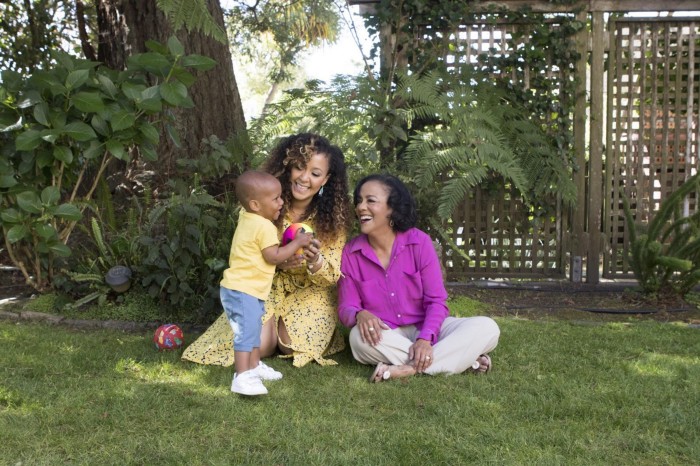
Julia with her son, Mosi, and mother.
I love that really holistic look at everything from hiring to pricing. Thank you for walking through that. Looking bigger picture, would love to ask — what part of this journey has brought you the most joy?
For me, Planet FWD is the culmination of so much dreaming over the last decade. I’ve always wanted for the stars to align in a way that allowed me to create something that really, truly makes the world a better place. Having the opportunity to tackle climate change through a food product with an awesome, diverse team makes it just a joy. Every day, I wake up and feel blessed to have the opportunity to work on this company. A moment in the future that I look forward to is when my son is old enough to be aware of what I’m working on, and that he’ll look at me and say that he’s proud of the work that I’ve done.
Speaking to that a little more, I know Planet FWD and this mission is incredibly important to you, your family is also incredibly important to you. With all of these moving pieces, how do you define success, in your life and your career?
Success in my career is measuring the degree to which I’m able to align my purpose with my work. The closer those things become, the closer the path that I’m walking with my purpose on the planet aligns with the path that I’m walking as an entrepreneur, the better I’m doing. That’s the way that I measure myself. There’s so many things that we can do for work, there are so many ways that we can make money. I only want to do the things that align with what my mission is on this Earth, and that is truly to create better outcomes for people on the planet through food.
On a personal level, I really just want to be a vehicle for joy for my family. I want them to feel joy and happiness in my presence. I can never be perfect as a partner, I can never be perfect as a mom, but I can certainly be a beam of light for my family and that is what I try to do every day.
Follow Julia:
Twitter — @JuliaCollins
Instagram — @JuliaECollins
